October 15, 2013
by Robin Parker -

We participated in a silent tea. We used no tech, low tech, and high-tech AAC. For 1 hour. With a group of graduate students, families, and clients. We only communicated with AAC, no natural speech. It was enlightening to say the least. We have done silent teas before, but not recently and as it turns out, a lot was forgotten. Lessons Learned: Communication Takes Longer. Communication takes much longer when using a speech generating device. This is true even when you know the message you are trying to compose, even when you know where the symbols or words are located. We are pretty good at using pause time and waiting expectantly but realized we need to probably wait even longer for messages to be composed. As long as the interaction is continuing, waiting 45 seconds is not too long and if you see someone in... [Read More...]
Filed under: PrAACtical Thinking
October 14, 2013
by Carole Zangari -
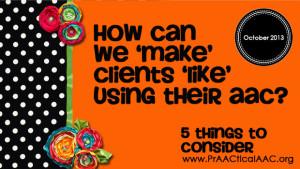
That’s a question we hear from time to time, and it often stops us in our tracks. The good thing about this question is that is signals that the clinician recognizes a stumbling block and is searching for a way around it. Like many things in our lives as SLPs, it’s all about problem-solving. So, how DO you make learners like their AAC? Well, for starters, we don’t like ‘making’ people do anything. Offer, entice, tempt? Yes, frequently. ‘Make’? Not our first, second, or third choice. If we have a really strong rationale and we’ve run out of other options, we may go there. When it comes to helping our clients learn to like their AAC systems, here are some things we think about. 1. We like what we’re good at: Until someone is proficient at aspects of their AAC system, it will feel like work. Why? Because it is... [Read More...]
Filed under: PrAACtical Thinking
Tagged With: client perspective, client-centered
October 11, 2013
by Robin Parker -
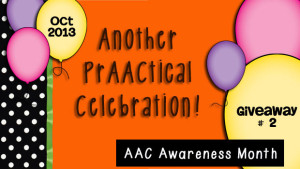
It’s time for the 2nd 2013 AAC Awareness Month celebration! It is so exciting to see all of the AAC activities and plans from around the country and world to help spread AAC Awareness. There has been sharing of AAC information, AAC decorations, Silent teas, and much more. We hope that with increased awareness, there is increased ACCESS for ALL who need it. Keep spreading AAC information and keep teaching & learning. HAPPY INTERNATIONAL AAC AWARENESS MONTH! Celebrate with us by entering our AAC giveaway. Good Luck Everyone! The PrAACtical AAC Celebration is made possible by the very generous and awesome people at the organizations listed below: : Ablenet, Inc Abilipad Alexicom BeeVisual/ChoiceWorks Dynavox/Mayer Johnson Handhold Adaptive Hump Software MarbleSoft Mozzaz News-2-You Paul H. Brookes Publishing Company Safe N Sound Mobile Silver Lining Multimedia Smarty Ears Speak For Yourself SpeechPathology.com SpeechTree TapSpeak TherapyBox/TBoxApps TouchChat Verbally How Does It Work?... [Read More...]
Filed under: PrAACtical Thinking
Tagged With: AAC Awareness Month
October 10, 2013
by Carole Zangari -
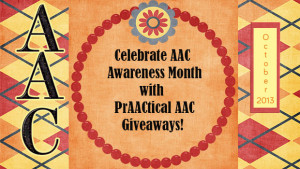
It’s been an exciting beginning to AAC Awareness Month! There were many lucky winners in Celebration #1! The winners for PrAACtical AAC Celebration are # 1 are Susan J., Linda K., Tracey Z., Lauren E., Jeanne T., Krista C., Alison A., Robin S., Laura K., Cassandra S., Becky K., Claire G., Susan G., Melissa S., Felicia W., Alecia W., Diane F., Danette P., Doug M., Shannon L., Jeannie M., & Barbara F. Congratulations to the winners! Please join us in giving virtual round of applause to these generous companies: Ablenet, Inc Alexicom BeeVisual Choice Works Dynavox Hump Software Mozzaz News-2-You Paul H. Brookes Publishing Company Safe N Sound Mobile Silver Lining Multimedia Smarty Ears Speak For Yourself SpeechPathology.com TapSpeak TherapyBox/TBoxApps Look for a new PrAACtical AAC Celebration on Friday (tomorrow).
Filed under: PrAACtical Thinking
Tagged With: celebration, Giveaway
October 9, 2013
by Robin Parker -
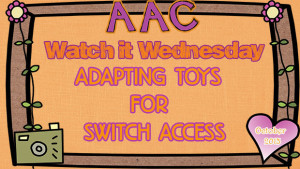
Playing is fun!- Adapting Toys for Switch Access.
Filed under: PrAACtical Thinking
Tagged With: Playing, Switch Access, toys
October 8, 2013
by Carole Zangari -
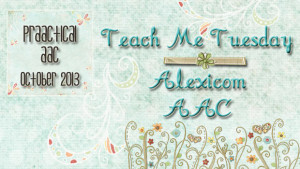
Teach Me Tuesday is a new feature that offers prAACtical resources for our colleagues who are looking to learn more about SGDs and AAC apps. Each week, we’ll share training resources that we’ve found to be helpful for those of us teaching ourselves how to use these things. There is no rhyme or reason to which ones we share each week, and endorsement should not be implied. As always, it’s up to each SLP and team to make recommendations based on their assessment data and other relevant factors. If you have devices or apps that you need to know more about, feel free to contact us and we will put that on our list. If you are an author, vendor, or developer who wants to share materials with us, we certainly welcome and appreciate that, but they must come with no strings attached. The product may or may not get... [Read More...]
Filed under: PrAACtical Thinking
Tagged With: Alexicom, Teach Me Tuesday, tutorial
October 7, 2013
by Robin Parker -

Strategy of the Month Infusing Literacy Learning Opportunities into AAC Therapies AAC & Literacy: Setting the Stage Literacy Lessons for Beginning AAC Learners Literacy for Everyone with Adapted Books PrAACtical Thinking PrAACtical Resources: A Look at the NJC The PrAACtical Power of Contrast 31 Posts You May Have Missed in August Literacy: Cookies & Core 5 Things to Love About the SETT Framework 10 Tips to Encourage Love of Literacy 5 Easy Ways to Add Authentic Writing Experiences to Your AAC Therapy AAC & Dinosaur Apps for Literacy & Language 5 AAC Strategies and the Use It of Loose It Philosophy 10 AAC Intervention Apps We Can’t Live Without 5 Things to Consider About Prompts in Teaching AAC Loving Literacy in AAC Keep Calm & Write ON.. fro All Writers Thoughts on Involving Our Clients in AAC Vocabulary Selection Presuming Competence & Teaching AAC 5 reasons We Don’t (Typically) Use... [Read More...]
Filed under: PrAACtical Thinking
Tagged With: literacy, past posts
October 4, 2013
by Robin Parker -
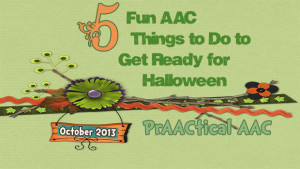
We love to start planning for holidays early. It helps facilitate conversation before, during, & after exciting activities and events. When we begin using core and fringe vocabulary early, frequently, and authentically the learner has the most opportunity for success. Use Schedules: Use a monthly calendar to have a Halloween countdown, Use mini-schedules to make food recipes, spooky science concoctions, or even to plan the trick or treating routes. Use a small talk app like Fat Cat Spooky Chat to prAACtice what you will SAY (October core words) on Halloween. Use a social narrative to prepare everyone for what to expect on and around Halloween. More Halloween social narratives can be found at Autism Community, One Place for Special Needs, Katherine Sanger You Tube, & Kentucky Autism Training Center Prepare a choice board of Halloween costume options and let the learner decide on the costume. PrAACtice a script to be... [Read More...]
Filed under: PrAACtical Thinking
Tagged With: Halloween, Meaningful Language, schedules
October 3, 2013
by Carole Zangari -
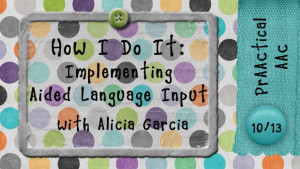
We are so pleased to have reconnected with SLP Alicia Garcia and are even more delighted that she agreed to do a guest post. Alicia is the clinical lead of the AAC Clinic at One Kids Place, a children’s treatment centre in northern Ontario. She has over 20 years of experience in pediatric rehabilitation practice in private and public settings, including clinical practice in AAC clinics and programs in Wisconsin, Florida, and now in Ontario. In this post, Alicia addresses one of our favorite clinical strategies in a very prAACtical way. Implementing Aided Language Stimulation: 8 Frequent Mistakes and How to Avoid Them Aided Language seems like a simple concept: Partners should model or demonstrate picture communication when talking to children who are learning to use picture communication, so that they would learn by example. Yet, when it comes to implementation we see frequent mistakes and misinterpretations. The most commons being:... [Read More...]
Filed under: PrAACtical Thinking
Tagged With: aided language input, Alicia Garcia, How I Do It
October 2, 2013
by Robin Parker -
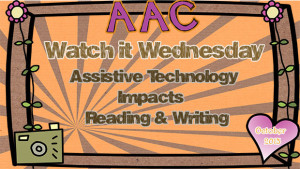
Another must watch TED Talk. Learn how assistive technology helped Ron McCallum prove his mother wrong. He discusses how technology has progressed to improve every aspect of his reading and writing life. He advocates for full accessibility of written material for everyone in every country.
Filed under: PrAACtical Thinking
Tagged With: assistive technology, literacy, reading, writing









